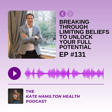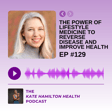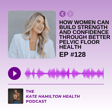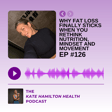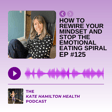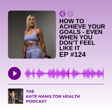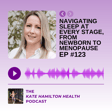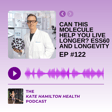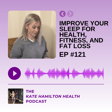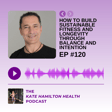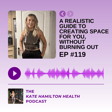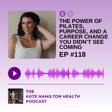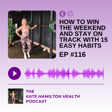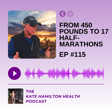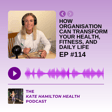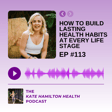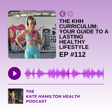
#109: Charlotte Melki: Letting go of ego and rewiring your mind with cognitive hypnotherapy
In this episode of The Kate Hamilton Health Podcast, I sit down with Charlotte Melki - a cognitive hypnotherapist, NLP practitioner, and performance coach - to explore how we can break free from self-doubt, imposter syndrome, and limiting beliefs.
Charlotte shares her journey from high-pressure marketing roles to discovering the power of cognitive hypnotherapy, blending neuroscience-backed techniques to help others transform their mindset.
We chat about the differences between the brain and the mind, the role of ego in shaping our identity, and how subconscious beliefs drive our behaviors. Charlotte also unpacks the connection between emotional needs, binge eating, and self-sabotage, offering practical, science-driven strategies to create lasting change.
If you're ready to rewire your thoughts, challenge limiting beliefs, and step into your true self, this episode is packed with insights you won’t want to miss!
Episode Highlights:
[00:00] – Welcome to the podcast & introducing Charlotte Melki
[02:18] – Charlotte’s journey from marketing to cognitive hypnotherapy
[05:27] – Brain vs. mind: What’s the difference?
[06:55] – Understanding ego, the self, and how they shape identity
[13:07] – How childhood experiences influence ego development
[15:57] – The power of thoughts and feelings in shaping behavior
[23:24] – Overcoming binge eating & emotional triggers
[28:17] – Recognizing physical vs. emotional discomfort
[30:42] – How to create space between thoughts & reactions
[32:26] – Understanding emotional needs & breaking self-sabotage
[37:19] – The surprising benefits of boredom & mindfulness
[41:24] – How to reconnect with your true self
[48:43] – How cognitive hypnotherapy & NLP can rewire limiting beliefs
Links & Resources:
- Connect with Charlotte on Instagram here
If you enjoyed this episode, please subscribe, leave a review, and share it with friends who might benefit. For more health and fitness tips, follow me on Instagram and TikTok @katehamiltonhealth.
Music b LiQWYD Free download: hypeddit.com/link/xxtopb [http://hypeddit.com/link/xxtopb] Promoted by FreeMusicPromo [https://www.youtube.com/channel/UCbycji-eySnM3WD8mbxPUSQ] / @freemusicpromo
